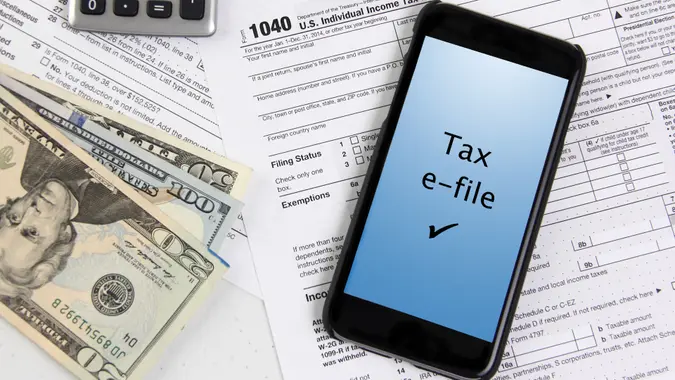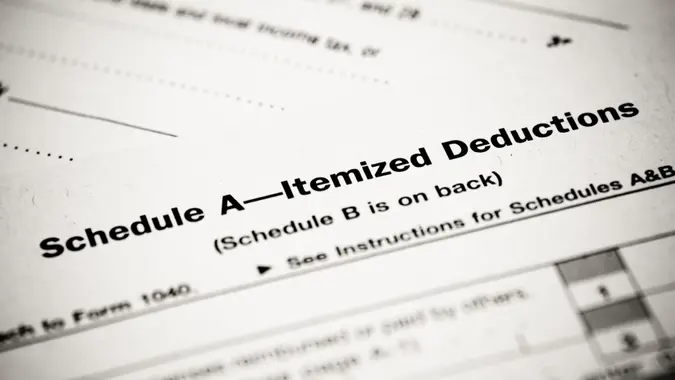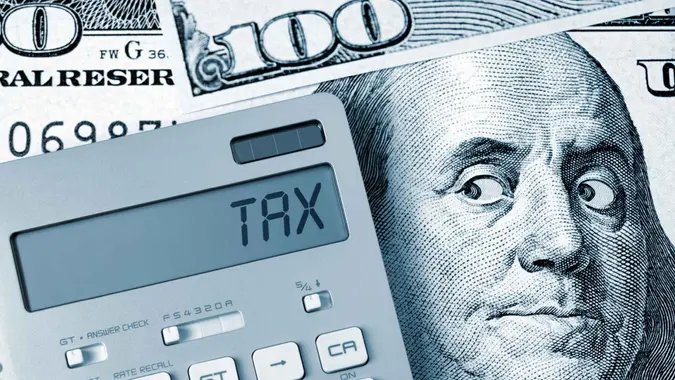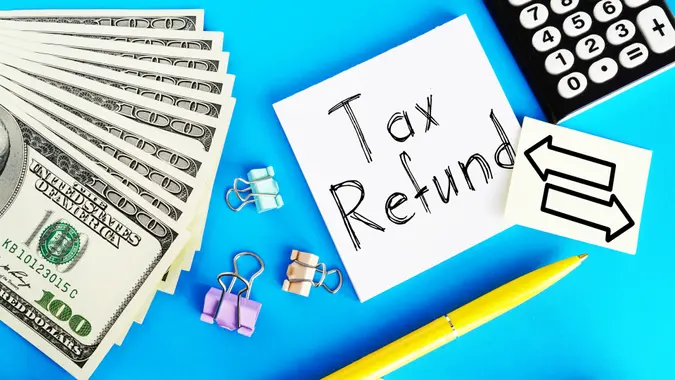When Will I Get My 2026 Tax Refund? Key Dates and How to Track

Commitment to Our Readers
GOBankingRates' editorial team is committed to bringing you unbiased reviews and information. We use data-driven methodologies to evaluate financial products and services - our reviews and ratings are not influenced by advertisers. You can read more about our editorial guidelines and our products and services review methodology.

20 Years
Helping You Live Richer

Reviewed
by Experts

Trusted by
Millions of Readers
Most taxpayers who file electronically and choose direct deposit can expect to receive their 2026 tax refund within about three weeks of filing, assuming there are no errors or delays. The exact timing depends on when you file, how you submit your return, and whether your return includes items that require extra IRS review.
Knowing the key refund dates–and how to track your refund–can help you set realistic expectations, avoid unnecessary worry, and spot issues early if your money takes longer to arrive.
2026 IRS Tax Refund Timing Estimates
How you file — and how you choose to receive your refund — has a big impact on how quickly your money arrives. The table below shows typical refund timelines based on filing method, according to the Internal Revenue Service.
| Filing Method | Estimated Refund Timing |
|---|---|
| E-file with direct deposit | About 1-3 weeks |
| E-file with a mailed check | About 1 month |
| Paper file with direct deposit | 6 weeks or more |
| Paper file with a mailed check | Up to 2 months |
Electronic filing and direct deposit are consistently the fastest options. Paper returns and mailed checks take longer because they require manual processing.
Key Dates for the 2026 Tax Season
Knowing the major tax deadlines can help you plan ahead, file on time, and avoid delays that could slow your refund. Below are the most important federal tax dates for the 2026 tax season.
| 2026 Tax Date | What It Means |
|---|---|
| Jan. 15, 2026 | Deadline for fourth-quarter estimated tax payments for income earned Sept. 1-Dec. 31, 2025 |
| Jan. 26, 2026 | IRS begins accepting and processing 2025 federal tax returns |
| Feb. 2, 2026 | Deadline to receive your W-2 (employers must send by Jan. 31) |
| Feb. 15, 2026 | Deadline to submit a Form W-4 claiming tax-exempt status for 2026 |
| April 15, 2026 | Tax filing deadline for most taxpayers; deadline to pay taxes owed, file for an extension, and make first-quarter estimated tax payments for 2026 |
| June 15, 2026 | Deadline for second-quarter estimated tax payments; also the filing deadline for Americans living abroad |
| Sept. 15, 2026 | Deadline for third-quarter estimated tax payments |
| Oct. 15, 2026 | Final deadline to file if you requested a tax extension |
| Dec. 31, 2026 | Deadline for 401(k), Roth 401(k), and other employer plan contributions, as well as charitable donations for the 2026 tax year |
Filing early — especially as soon as the IRS begins accepting returns — can help you get your refund faster and reduce the risk of delays caused by missing forms, identity verification issues, or processing backlogs.
How To Track Your 2026 Tax Refund
Once you’ve filed your federal income tax return, you can track the status of your refund directly through the Internal Revenue Service using the Where’s My Refund? tool on its website. The tracker typically becomes available within 24 hours of e-filing (or several weeks after mailing a paper return).
You can also check your refund status using the IRS2Go mobile app, which provides the same information and updates.
When tracking your refund, you’ll see one of three status messages:
- Return received. The IRS has your return and is processing it
- Refund approved. Your refund amount is finalized and scheduled for payment
- Refund sent. Your refund has been issued by direct deposit or mailed check
Refund statuses are updated once per day, usually overnight, so checking more frequently won’t produce new information.
What You’ll Need to Track Your Refund
To check your refund status, you’ll need three pieces of information exactly as they appear on your tax return:
- Your Social Security number (or ITIN)
- Your filing status
- The exact refund amount shown on your return
When selecting your filing status, choose one of the following:
- Single
- Married Filing Jointly
- Married Filing Separately
- Head of Household
- Qualifying Widow(er)
Providing this information allows the Internal Revenue Service to verify your identity and protect your tax data from unauthorized access.
In most cases, you can begin tracking your refund within 24 hours of e-filing, or about four weeks after mailing a paper return.
How To Get Your Tax Refund Faster
If you’re counting on your tax refund, waiting can be stressful. While some delays are outside your control, a few smart steps can help your refund move through the system as quickly as possible.
- File as early as you can. In general, the sooner you file, the sooner the IRS can begin processing your return.
- Double-check your return for errors. Missing information or mistakes can trigger follow-up requests that slow processing. Amended returns (Form 1040-X) can take weeks just to appear in the system and up to 16 weeks to process.
- E-file and choose direct deposit. Electronic filing paired with direct deposit is consistently the fastest option. Your bank may still take a few days to post the funds once the IRS sends them.
- Use an eligible bank account. The IRS can only deposit refunds into an account in your name, your spouse’s name, or a joint account.
- Be aware of credit-related delays. Returns that claim the Earned Income Tax Credit (EITC) or the Additional Child Tax Credit (ACTC) are typically held until at least late February due to fraud-prevention rules.
Taking these steps won’t guarantee an instant refund, but they can help you avoid the most common — and preventable — causes of delay.
What If You File Your Taxes Late?
Filing late doesn’t always mean trouble–but it can get expensive if you owe money. If the Internal Revenue Service owes you a refund, filing after the deadline generally won’t trigger penalties. You can still claim your refund, although you’ll have to wait longer to receive it.
The situation is different if you owe taxes. In that case, the IRS may assess two separate penalties:
- Failure-to-file penalty: Typically 5% of the unpaid tax for each month your return is late, capped at 25% of the amount owed.
- Failure-to-pay penalty: Usually 0.5% of the unpaid tax per month, also capped at 25%.
If you file your return but pay late, the penalties are reduced. That’s why it’s often better to file on time — even if you can’t pay the full amount right away. Doing so can significantly limit how much you’ll owe in penalties while you work out payment options.
How to Request a Tax Filing Extension
If you need more time to file your tax return, you can request a six-month filing extension from the Internal Revenue Service. This extension moves your filing deadline from April 15, 2026, to October 15, 2026.
If you’re e-filing, you can request an extension for free using the IRS Free File system. Paper filers must submit Form 4868 by the original filing deadline to receive the extension.
It’s important to understand what an extension does — and doesn’t — do. While it protects you from late-filing penalties, it does not extend the time to pay. Any taxes you owe are still due by April 15, and unpaid balances can trigger penalties and interest even if you file by October.
If you expect to owe, paying as much as you can by the April deadline can help minimize additional costs while giving you more time to finalize your return.
Why Your Tax Refund Might Be Delayed
Even if you file on time, some refunds take longer to process than others. According to the Internal Revenue Service, the most common causes of refund delays include:
- Errors or missing information on your return, which may require manual review
- Amended returns, which typically take up to 16 weeks to process
- Injured spouse claims, which require additional verification
- ITIN renewals, which can pause processing until the number is validated
- Direct deposit limits, since the IRS allows no more than three refunds per year to be deposited into a single bank account
While some delays are unavoidable, you can reduce future frustration by adjusting your tax withholding. Fine-tuning your withholding can help you avoid overpaying throughout the year — so more of your money stays in your paycheck instead of being tied up in a delayed refund. Just be careful not to under-withhold, which could leave you owing taxes at filing time.
When To Call the IRS To Check Tax Refund Status
Waiting on a tax refund can be stressful, but calling the IRS too early usually won’t speed things up. The Internal Revenue Service recommends reaching out only if one of the following applies:
- It’s been more than 21 days since you e-filed your return
- It’s been six weeks or longer since you mailed a paper return
- The Where’s My Refund? tool specifically instructs you to contact the IRS
Before calling, make sure you have your Social Security number or ITIN, your filing status, and your refund amount handy. Having this information ready can help the IRS locate your return more quickly and reduce time on hold.
If none of these conditions apply, it’s usually best to wait and continue checking your refund status online, as most refunds move through the system without any action required.
When Can You Expect Your State Tax Refund?
State tax refunds follow a different timeline than federal refunds, and processing times vary widely by state. Factors such as when you file, how you file, and your state’s review process all affect how quickly your refund is issued. As with federal taxes, filing electronically is usually the fastest way to receive a state refund.
To check the status of your state refund, visit your state’s department of taxation or revenue website. You’ll typically need to provide personal and tax details — such as your Social Security number, filing status, and refund amount — to access updates.
Keep in mind that some states now issue refunds on prepaid debit cards instead of paper checks. This option can speed delivery and make refunds more accessible for taxpayers who don’t use direct deposit.
Should You Consider a Refund Anticipation Loan?
Refund anticipation loans (RALs) are short-term loans offered by third parties — such as tax preparers, CPAs, or banks — based on your expected federal tax refund. The loan is repaid once your refund is issued.
The main appeal is speed. A RAL can put cash in your hands quickly if you’re facing an urgent expense and don’t want to wait for the IRS to process your return. The tradeoff is cost. These loans often come with high interest rates and fees, and you’re still responsible for repayment–even if your refund is delayed or ends up being smaller than expected.
For many taxpayers, filing early and choosing e-file with direct deposit is a safer and less expensive way to get a refund quickly. A refund anticipation loan may make sense in limited situations, but it’s worth weighing the cost carefully before borrowing against money that’s already on the way.
FAQ
- When Will I Get My Tax Refund?
- If you e-file and choose direct deposit, most refunds arrive within 21 days. Paper returns or mailed checks can take six to eight weeks or longer.
- Why Is My Refund Smaller Than Expected?
- Your refund may have been offset to pay debts like past-due child support, unpaid state taxes, or federal agency debts. You’ll usually receive a notice from the Bureau of the Fiscal Service explaining the adjustment.
- Can I Change My Direct Deposit Bank Account After Filing?
- No. Once filed, direct deposit details can’t be changed. If the deposit hasn’t been issued, you may be able to stop it by contacting the Internal Revenue Service. Otherwise, the IRS will issue a paper check if the funds are returned.
Our in-house research team and on-site financial experts work together to create content that’s accurate, impartial, and up to date. We fact-check every single statistic, quote and fact using trusted primary resources to make sure the information we provide is correct. You can learn more about GOBankingRates’ processes and standards in our editorial policy.
- IRS. "REFUNDS -- HOW LONG SHOULD THEY TAKE?"
- IRS. "Publication 509."
- IRS. "IRS releases tax inflation adjustments for tax year 2025"
- IRS. "IRS provides tax inflation adjustments for tax year 2024"
- IRS. "Topic no. 203, Reduced refund"
- IRS. "IRS provides tax inflation adjustments for tax year 2024"
- IRS. " Refund Inquiries 18"
- IRS. "Failure to Pay Penalty."
 Written by
Written by  Edited by
Edited by 























